|
|
|
Sort Order |
|
|
|
Items / Page
|
|
|
|
|
|
|
| Srl | Item |
| 1 |
ID:
181659
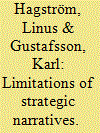

|
|
|
|
|
| Summary/Abstract |
Recent research has explored how the Sino-American narrative struggle around COVID-19 might affect power shift dynamics and world order. An underlying assumption is that states craft strategic narratives in attempts to gain international support for their understandings of reality. This article evaluates such claims taking a mixed-methods approach. It analyzes American and Chinese strategic narratives about the pandemic, and their global diffusion and resonance in regional states that are important to the U.S.-led world order: Australia, India, South Korea, Turkey, and the United Kingdom. While the article confirms that strategic narratives remain a highly popular policy instrument, it argues that their efficacy appears limited. Overall, the five states in question either ignored the Sino-American narrative power battle by disseminating their own strategic narratives, or they engaged in “narrative hedging.” Moreover, even China’s narrative entrepreneurship was enabled and constrained by pre-existing master narratives integral to the current U.S.-led world order.
|
|
|
|
|
|
|
|
|
|
|
|
|
|
|
|
| 2 |
ID:
167604
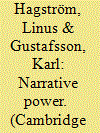

|
|
|
|
|
| Summary/Abstract |
We are living at a time when people appear to have become more aware of the power of narratives in international politics. Understanding how narratives exercise power is therefore more pertinent than ever. This special issue develops the concept of narrative power for international relations research by focusing on East Asia—the region that has been at the centre of debates about international power shifts since the 1990s. This introduction seeks to elucidate and define four key binary distinctions: (a) narrative power as understood from the perspective of an individualist versus a narrative ontology; (b) narrative power as explanandum versus explanans; (c) narrative power as more prone to continuity or change; and (d) the scholar as a detached observer of narrative power versus the scholar as a narrative entrepreneur and a potential wielder of power. Informed by the individual contributions, the introduction demonstrates how and with what implications research on narrative power can negotiate and traverse these binary distinctions.
|
|
|
|
|
|
|
|
|
|
|
|
|
|
|
|
| 3 |
ID:
092506
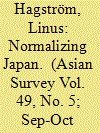

|
|
|
| 4 |
ID:
149316
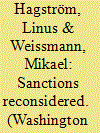

|
|
|
|
|
| Summary/Abstract |
Since at least the early 1990s,11. This research was funded by grants from the Swedish Ministry of Foreign Affairs within the Special Research Program of the Swedish Institute of International Affairs and the Marianne and Marcus Wallenberg Foundation (MMW 2013.0162). The opinions expressed are those of the authors alone.
View all notes
there have been regular predictions of North Korea's imminent collapse—so much so that a degree of wishful thinking or “collapsism” has even characterized the debate.22. Jong-kun Choi, “The Perils of Strategic Patience with North Korea,” The Washington Quarterly 38, no. 4 (Winter 2016), pp. 57–72, http://www.tandfonline.com/doi/abs/10.1080/0163660X.2015.1125829.
View all notes
Yet, the state has managed to survive, despite its corrupt deity-cult leadership, devastating famines, a largely failed economy, and an increasingly stringent international sanctions regime. In fact, North Korea's regime has not only survived, but also succeeded in resisting international pressures aimed at rolling back its nuclear program.
|
|
|
|
|
|
|
|
|
|
|
|
|
|
|
|
| 5 |
ID:
172424
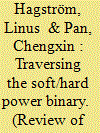

|
|
|
|
|
| Summary/Abstract |
Soft power and hard power are conceptualised in International Relations as empirically and normatively dichotomous, and practically opposite – one intangible, attractive, and legitimate, the other tangible, coercive, and less legitimate. This article critiques this binary conceptualisation, arguing that it is discursively constructed with and for the construction of Self and Other. It further demonstrates that practices commonly labelled and understood as soft power and hard power are closely interconnected. Best understood as ‘representational force’ and ‘physical force’ respectively, soft and hard power intertwine through the operation of productive and disciplinary forms of power. We illustrate this argument by analysing the Sino-Japanese dispute over the Diaoyu/Senkaku Islands. Both governments exercise representational force in constructing their respective versions of events and Self/Other. The soft/hard power binary itself plays a performative role as the Self is typically associated with soft power and the Other with hard power. The operation of productive power, moreover, privileges the attractiveness of the former and the repellence of the latter, and disciplinary power physically enforces these distinctions on subjects in both states. Finally, reinforced Self/Other distinctions legitimise preparations for violence against the Other on both sides, thus exposing how fundamentally entangled soft and hard power are in practice.
|
|
|
|
|
|
|
|
|
|
|
|
|
|
|
|
| 6 |
ID:
144057
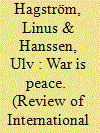

|
|
|
|
|
| Summary/Abstract |
This article demonstrates that a national identity defined by a normative commitment to peace is not necessarily an antidote to remilitarisation and war. More specifically, the article takes issue with the debate about the trajectory of Japan’s security and defence policy. One strand of the debate holds that Japan is normatively committed to peace while the other claims that Japan is in the process of remilitarising. This article argues that the two positions are not mutually exclusive – a point that has been overlooked in the literature. The article uses discourse analysis to trace how ‘peace’ was discussed in debates about China in the Japanese Diet in 1972 and 2009–12. It demonstrates how rearticulations by right wing discourses in the latter period have depicted peace as something that must be defended actively, and thus as compatible with remilitarisation or military normalisation. Japan’s changing peace identity could undermine rather than stabilise peaceful relations with its East Asian neighbours.
|
|
|
|
|
|
|
|
|
|
|
|
|
|
|
|
|
|
|
|
|